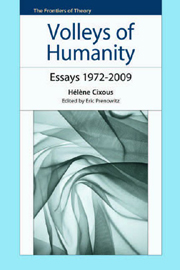Book contents
- Frontmatter
- Contents
- Sources
- Series Editor's Preface
- Introduction: Cixousian Gambols
- 1 Fiction and Its Phantoms: A Reading of Freud's Das Unheimliche (The ‘Uncanny’)
- 2 The Character of ‘Character’
- 3 Missexuality: Where Come I Play?
- 4 The Pleasure Reinciple or Paradox Lost
- 5 Reaching the Point of Wheat, or A Portrait of the Artist as a Maturing Woman
- 6 Letter to Zohra Drif
- 7 The Names of Oran
- 8 The Book as One of Its Own Characters
- 9 How Not to Speak of Algeria
- 10 The Oklahoma Nature Theater Is Recruiting
- 11 The Book I Don't Write
- 12 The Unforeseeable
- 13 Passion Michel Foucault
- 14 Promised Cities
- 15 Volleys of Humanity
- Acknowledgements
- Index
5 - Reaching the Point of Wheat, or A Portrait of the Artist as a Maturing Woman
Published online by Cambridge University Press: 12 September 2012
- Frontmatter
- Contents
- Sources
- Series Editor's Preface
- Introduction: Cixousian Gambols
- 1 Fiction and Its Phantoms: A Reading of Freud's Das Unheimliche (The ‘Uncanny’)
- 2 The Character of ‘Character’
- 3 Missexuality: Where Come I Play?
- 4 The Pleasure Reinciple or Paradox Lost
- 5 Reaching the Point of Wheat, or A Portrait of the Artist as a Maturing Woman
- 6 Letter to Zohra Drif
- 7 The Names of Oran
- 8 The Book as One of Its Own Characters
- 9 How Not to Speak of Algeria
- 10 The Oklahoma Nature Theater Is Recruiting
- 11 The Book I Don't Write
- 12 The Unforeseeable
- 13 Passion Michel Foucault
- 14 Promised Cities
- 15 Volleys of Humanity
- Acknowledgements
- Index
Summary
You have probably recognised that the title of my essay is an imitation of the title of Joyce's A Portrait of the Artist as a Young Man. I have chosen to pursue a kind of meditation on creation and perhaps also on the different attitudes that men and women show with regard to becoming an artist. The moment I say that, I reproach myself for using the words men and women. We have difficulties nowadays with those words. At first I want simply to give a kind of warning. We always get confused because of those words, but we have to deal with them, we have to struggle with them. We must be very careful not to be too fascinated and deceived by them. When I use the word man or woman, I should open a parenthesis and explain what I mean by it. The first thing I want to say is simply this: when an author signs with a woman's name, it does not mean that the book can be said to be ‘feminine’. This is banal, this is obvious, but I want to say it because I myself am a victim of what I am saying. Because I thought they were the best possible examples, I had to choose Joyce and Clarice Lispector – Joyce in order to illustrate what I feel about the artist as a young man, and Clarice Lispector because of what she has to say about women. And it happens that he is a man and she is a woman. It could happen a little differently; maybe a man would have had something to say about female or ‘feminine’ writing, or vice versa. And so every time I say ‘masculine’ or ‘feminine’, or ‘man’ or ‘woman’, please use as many quotation marks as you need to avoid taking these terms too literally.
- Type
- Chapter
- Information
- Volleys of HumanityEssays 1972–2009, pp. 85 - 105Publisher: Edinburgh University PressPrint publication year: 2011



